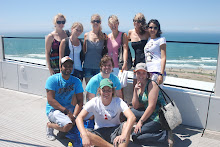On Monday 15 March 2010, we executed our first attempt at an activation and intervention. For this, we decided to look at the notions of a ‘Public Open Space.’ According to the By-Laws document released by the Municipality (available for download at http://www.sa2010.gov.za/node/1846), ‘Public Open Space’ is defined as any land that it owned by an organ of the state, that the state has certain real rights over and/or any land that is controlled/managed by the municipality.
In turn it is also land that has been set aside for public recreational purposes, conservation and/or infrastructural/agricultural development. It encompasses land that has not yet been developed or set aside for specific purpose, and any land or space used for public recreational or cultural activities e.g. public gyms, sports fields, nature parks, botanical gardens, public swimming pools, etc. So, as you can probably deduce, it encompasses a fair amount of space that the general public frequent on a daily basis.
Now associated with this Public Open Space are a hefty set of restrictions and prohibitions. The 11 By-laws that I would like readers to pay attention to, and that we questioned with the Frisbee intervention, generally fall under the General Prohibition heading. The summarised list of eleven reads as such:
In a Public Open Space you may not (without the approval of the Municipality):
1. Cause a nuisance to other users of the Public Open Space
2. Obstruct any other person using or entering the space
3. Interfere with any works
4. Congregate in a manner that causes obstruction
5. Carry any object that could cause harm
6. Throw any object, of any nature onto or within the space
7. Bathe, wade or swim in any body of water near or within the space
8. Cause anything to be left or deposited
9. Affix, place, arrange or create advertisement of any kind
10. Restrict the enjoyment of others
11. Create an event
You may be thinking that these seem obvious enough, and that questioning the by-laws isn’t at the top of your priorities list. I would however, encourage you to perhaps spend the next few minutes pondering the following: what is a nuisance? According to the by-laws a nuisance can be as simple as someone affecting another person’s enjoyment of the public space. In my mind this is pretty subjective, and the whole ‘different strokes, for different folks,’ phrase could apply.
Throwing an object of any nature- so that would include tennis balls, soccer balls, bouncy balls, rugby balls, Frisbees etc. but surely if Public Open Space is most often set aside for recreation, then this law is a bit counter-intuitive?
If the depositing of any matter that may obstruct or cause danger to others is illegal, then why are there so few bins provided where the public activity is taking place? At the stadium, in the Sky Car circle there are a total of two bins; one hidden to the side of the Sky Car, and another that sits at the far edge of the large expanse of the concrete circle. When we visited the stadium the litter and debris was already evident on the floors, and tucked into various cracks or crevices. When the traffic flow increases around match days and during the Term of the World Cup, how will two bins suffice for a Stadium that can hold 70 000 people?
Another question that I would like to raise is why we are not allowed to create events in Public Open Spaces? And what constitutes an event? In the by-laws document there is a definition for a Special Event, but no mention of what ‘any event,’ may refer to?
With these questions, one can begin to query the other By-Laws that exist around 2010. I would really encourage everyone to interact with the laws, and perhaps begin to question the effect the laws will and can have on our everyday life.
For the Frisbee activation we wanted to draw attention to the restrictions of use of Public Open Space, we also wanted to open more doorways for communication around the restrictions. In hindsight, we felt that the activation could have been stronger through communicating the exact restrictions, rather than keeping the information vague (as we had chosen to do.) We hope to hold another activation or event of this type, and will keep blog visitors posted on when and where it is happening.
The one success that we did feel that we achieved was to excite and energise the rather dull and institution-like space. The stadium garden is quite harsh and quiet, and the brightly coloured Frisbees created a stark contrast to the existing space. There was a marked increase in movement and space utilisation, which we were pleased to have driven. One may question why the space isn’t more actively utilised by FIFA and the Municipality as a space for fun and educational activity?
- Posted by Kate

